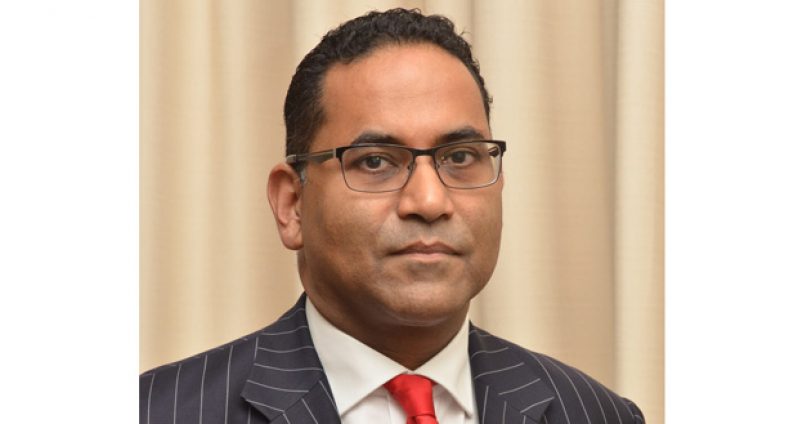By Ravin Singh
DESPITE being shelved after 2011, talks on the establishment of a tripartite budget committee could possibly resume, given that the Commonwealth Parliamentary Association (CPA) is ready to provide Guyana with the necessary advice should efforts to establish the committee be activated.This assertion was made by Secretary-General of the CPA, Akbar Khan, who spoke exclusively with the state media following one of the sessions on day two of the CPA Guyana Branch seminar. The seminar was held for local parliamentarians.
In December of 2011, then Opposition Leader David Granger called for the establishment of a tripartite budget committee before the end of the year, to oversee preparation of the 2012 national budget. He had said then that the committee would, among other things, “Collaborate with the Bank of Guyana, the Statistical Bureau, and other departments in presenting an accurate and detailed picture of the economy; identify all sources and funds, and examine potential sources of new funds,” as well as “propose the inclusion of programmes and projects consistent with public needs identified during the elections, such as programmes aimed at job-creation, community-renewal, improved education and poverty alleviation.
The committee, he had stated, would propose tax-reform measures, including the lowering of the Value-Added Tax (VAT) and personal income tax; and address their likely impact on revenue and economic growth. The committee, he added, would also “examine all categories of expenditure, and recommend areas where expenditure could be adjusted, foregone, revised, reviewed, renewed or removed.”
COULD BE REVIVED
And although this failed to manifest itself and the idea was subsequently shelved, it could be brought back to the table for discussion, given the commitment by the CPA to advise Guyana on best practices around the world regarding fiscal budgets.
Budget committees are not foreign to some states in the international community. In most cases, they are positioned within the framework of the parliamentary structure, and they also exist within international organisations such as the United Nations (UN) and the Council of Europe, which is the continent’s leading human rights organisation.
The budget committee there serves as an advisory body of the Council of Europe on administrative and financial matters. It advises on issues including the draft programme and budget of the organisation; the progress-review report on its implementation; the annual accounts of the organisation; and human resources and pension issues.
AVAILABLE MODELS
With the existence of models which could be modified to suit Guyana’s political landscape, Khan noted that the CPA will not be prescriptive about the way in which parliaments should deal with their budgets. This decision, he said, should be made entirely by the country.
However, he gave the assurance that the CPA will act as a supportive mechanism and advise countries, including Guyana, on how budgets are dealt with across jurisdictions, and which method works more effectively within National Assemblies.
Meanwhile, the Secretary-General sought to underscore the need for scrutiny of national budgets, reasoning that after a budget has been adopted, Public Accounts Committees have a very important purpose to track and evaluate where state revenues have been used.
“And those Public Accounts Committees, studies have shown that where they are used effectively, wastages are reduced, efficiencies are identified, and there is more sustainable implementation, particularly around economic development and good governance; and importantly, that the incidents of corruption are reduced,” he stated.
In Guyana, there are a number of committees which are set out in the Standing Orders; and with many of these committees being functional, the Secretary-General advised that members consider ways in which those committees can function more effectively.
Additionally, he recommended that consideration be given on how members can work on a “cross-party basis” to ensure proper oversight of parliamentary work, and to hold the Government accountable in terms of fiscal budgetary issues.
INCLUSIVE MANNER
Given the fact that the APNU+AFC Government holds a one-seat majority in the National Assembly, Khan highlighted that this feature brings out the need for both sides (Government and Opposition) to work together in an inclusive manner for the benefit of all Guyanese.
“I echo the findings of the Commonwealth Observation Group which did their post-election report [last year]: that they hope that the Government and Parliament will work together in an inclusive manner and bring confidence to the people, whom the Parliament represents,” he added.
The Secretary-General also explained that the CPA is keen on working with Parliaments to strengthen them, since they are the “centre of a society.” And being at the centre of society translates to this body being at the centre of accountability, given that its arm is extended to every branch of Government.
This characteristic of the legislative body, he said, imposes a duty on members to be transparent. And when this body is not functioning properly, it is difficult to conceive what kind of democracy a country has; which is why the CPA seeks to strengthen Parliaments and work with Parliamentarians by way of oversight of the Executive, he said.
“We work to encourage parliamentary oversight through the use of committees,” Khan noted.




.png)









